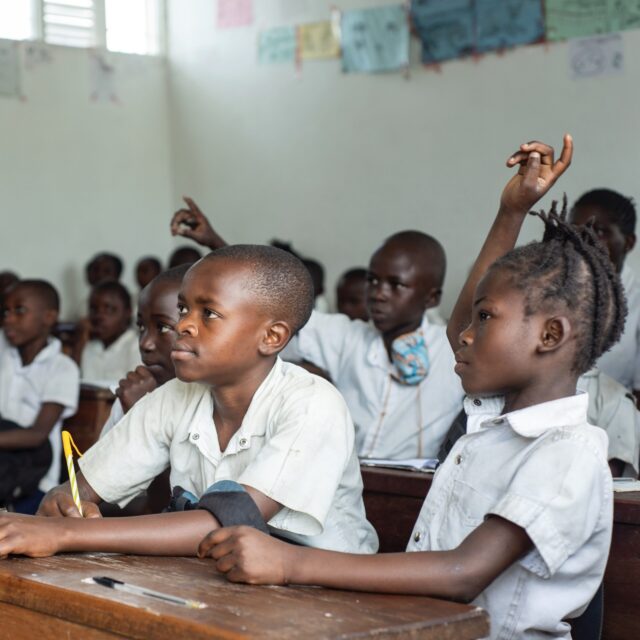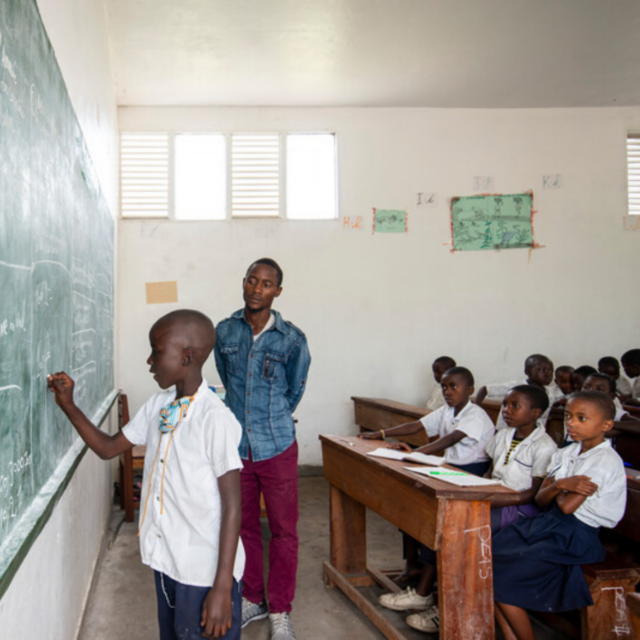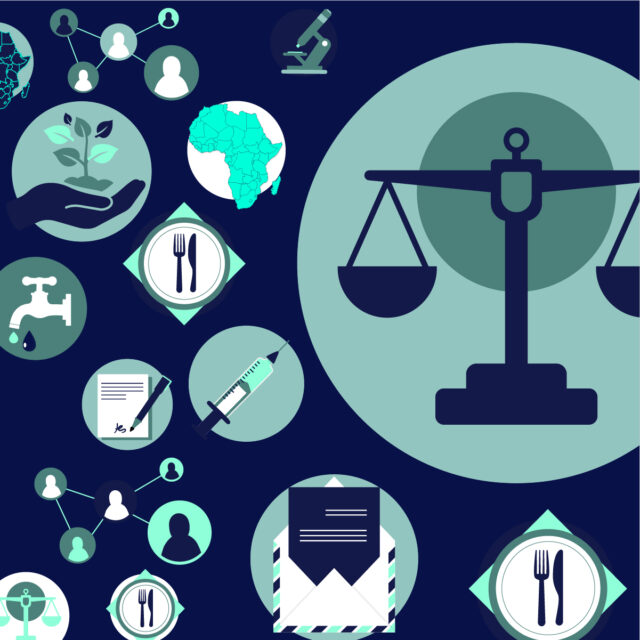Ahead of the Global Education Summit on July 28-29, hosted by the United Kingdom and Kenya in London, 82 civil society organizations and 14 Members of Parliament together with 6 artists and 43 individuals on the continent all from over 22 countries are asking African Heads of State to protect domestic public financing of education in their countries.
They are also urging them to endorse President Uhuru Kenyatta’s political statement on education. In it, he calls on them to prioritize, protect and increase domestic financing towards the 20% global benchmark, to set policies that ensure financing reaches the most vulnerable, leaving no child behind, and to ensure the efficient use of resources. 62,005 members of the public have also signed the education petition by ONE that highlights the same call.
Add your voice by signing ONE’s education petition.
Open Letter to African leaders
A call to action to protect public financing for education for an accelerated and sustainable economic recovery from the pandemic ahead of the Global Education Summit on July 28-29.
Your Excellencies,
President Uhuru Kenyatta, as a co-host with UK Prime Minister Boris Johnson of the unprecedented high-level Global Education Summit: Financing GPE 2021-2025, on July 28-29, made a call to action to his fellow Heads of State to endorse his political statement on education financing. The GPE replenishment will be a pivotal moment for the global community to come together to support quality education for all children and youth.
We appreciate your unwavering commitment to building a sustainable and prosperous continent.
Investment in human capital, including education, is the base upon which every nation thrives – eradicating poverty and fostering inclusive and sustained growth. It is the pathway to harness Africa’s demographic dividend and transform African economies, including ensuring the success of flagship initiatives such as the African Continental Free Trade Area (AfCFTA).
We, the undersigned, urge you to commit to protecting education expenditure to pre-COVID levels, increasing domestic financing towards the 20% global benchmark and beyond, set policies that are inclusive, advance gender equality and leave no child behind, and ensure the efficient use of resources. It is critical that education is prioritized in public expenditure enabled by the freed-up funds and new liquidity from debt relief initiatives and a new allocation of Special Drawing Rights (SDRs) when secured. It is also crucial that countries address critical spending inefficiencies. The 2020 African Economic Outlook highlighted Africa’s low efficiency in public spending as a cause of the continent’s lagging in education achievement.
It is also vital that countries reduce military spending to benefit increased education spending, which has the potential to foster peace and, in some cases, help address the grievances that lead to armed conflict. African girls and women, in particular, are calling for action to increase national budget allocations for education (and decrease that of militarization) to accelerate the development of quality, free and inclusive education at all levels, ensuring equal access for girls and boys. To echo the voice of Aya Chebbi, AU Youth Envoy ‘To address security, leaders need to deal with the root issues. Militarization is only a response. It doesn’t deal with prevention or transformation.’ Young people want to see money being invested in what will really build a future for them and the next generation, including through strong and inclusive economies. Through prioritizing education investments, young people want you to build forward better.
There are two other areas where governments can take action that could transform the financing of education in the coming years. Firstly, ambitious action to increase domestic tax revenues in progressive ways can generate sustainable resources for investment not only in education but also in health and other public services. Clear commitments to increase tax-to-GDP ratios through taxes on the wealthiest individuals and companies can dramatically transform the resources available for education. Secondly, governments can make clear commitments to resist any pressure for a premature return to austerity. The squeezing of public finances significantly affects education spending, perhaps most notably when constraints are placed on the overall public sector wage bill. Teachers are often the largest single group on the wage bill, so any cuts or freezes can disproportionately impact education spending. Investing in appropriate corruption tracking and mitigation mechanisms will also go a long way in ensuring all finances committed to education programs are utilized and accounted for as planned.
COVID-19 has led to the biggest education emergency in our lifetime. While the pandemic has claimed hundreds of thousands of lives on the continent today, it equally poses a significant threat to the future of millions of young people, particularly girls. In Africa, COVID merely exacerbated a pre-existing learning crisis. Prior to the pandemic, 87% of children in sub-Saharan Africa could not read and understand a simple story by their 10th birthday. More than half of all school-aged children could not master basic secondary-level skills, including critical competencies such as literacy, numeracy, problem-solving, and critical thinking.
The disruption caused by COVID-19 has worsened this learning deficit. At the pandemic’s peak, school closures impacted over 250 million children in Africa. Due to the pandemic, the number of out-of-school children and youth could now grow substantially for the first time in decades. We have also seen inequity and inequality grow because of the pandemic. Children who were already most at risk of being excluded from accessing quality education have been most affected. They have lost crucial school calendar years leading to a negative impact on their learning outcomes, period of stay in school and wellbeing. Girls, in particular, are likely to be disproportionately impacted, with an estimated 20 million school-aged girls at risk of dropping out permanently and 10 million more marriages likely to occur by 2030 due to school closures, increased adolescent pregnancy, disruption to child marriage programming and economic instability. This lost potential is catastrophic, not only for individuals but for future economies and generations to come. It could compromise the future of our continent and our capacity to recover from the ravages caused by the pandemic.
To avoid turning the continent’s learning crisis into a deep and long-lasting catastrophe, protecting and increasing investments in education is paramount. Our call to you is necessary because of the long history of underfunding the education sector in Africa. Between 2014 and 2018, sub-Saharan Africa governments spent an average of 17% of their expenditure on education- below the 20% threshold recommended by UNESCO. With COVID-19, education budgets are at an even greater risk. Only 5 out of the 25 countries with data met the required funding. While we understand Africa’s current financial difficulties, we cannot sacrifice today’s crisis for a catastrophic future. Decisiveness by African leaders and collaboration with other world leaders is needed to protect funding for the education sector.
The upcoming Global Education Summit is an important opportunity to secure financial commitments and political will, prioritize education and set the trajectory for the future. Africa has a once-in-a-generation opportunity to emerge from this crisis doing things differently – to build a more prosperous and equal future for ALL its children by transforming education and unlocking the Africa we want.
We call on you to endorse President Kenyatta’s statement and to make bold and ambitious individual country commitments to protect and increase education expenditure, to expand domestic tax revenues in fair ways and to resist a premature return to austerity. Investment in education is key to an accelerated recovery and tangible progress in every nation, even in the face of an economic downtown.
If we are to eradicate poverty and hunger – improve health, develop a skilled workforce, protect our planet, advance gender equality, and build a more inclusive and peaceful society- we must empower every individual with access to quality education. That starts with improving how governments finance the education of their children and youth to deliver long-lasting transformation.
Signed by:
MEMBERS OF PARLIAMENT
-
- Senator Dr Milgo Alice Chepkorir, Chair of the Education Committee in the Senate of Kenya (Kenya)
- Hon. Dennitah Ghati MP, Member of Parliament for Persons with Disabilities in the National Assembly of Kenya (Kenya)
- Senator Dr Gertrude Musuruve Inimah, Nominated Senator representing Persons with Disabilities in the National Assembly of Kenya and Co-Chair of the International Parliamentary Network for Education (Kenya)
- Hon. Peter Kwasi Nortsu-Kotoe, MP and ranking member of the Education Committee of the Parliament of Ghana (Ghana)
- Hon. Dr William Susuwele-Banda, Member of the National Assembly of Malawi and former Minister of Education (Malawi)
- Senator Hafida Benchehida, Senator in the Parliament of Algeria (Algeria)
- Hon. Agho Oliver Bamenju, Member of the National Assembly of Cameroon (Cameroon)
- Hon. Prof. Julius O. Ihonvbere, OON Chair of the House Committee on Basic Education & Services in the National Assembly of Nigeria; IPNEd Regional Representative for Africa (Nigeria)
- Hon. Deputy Boubacar Villiemmbo Biaye, General Manager of the Senegalese Parliamentary Network for the Promotion of Inclusive Education (REPSEI) (Senegal)
- Hon. Issa Mardo Djabir, Chair of the Standing Committee on Sustainable Development of the National Assembly in the National Assembly of Chad (Chad)
- Hon. Beatrice Adagala, Member of the National Assembly of Kenya (Kenya)
- Hon. Hayat Bouffarrachen, Member of the Parliament of Morocco (Morocco)
- Hon. Ibtissame Azzaoui, Member of the Parliament of Morocco and IPNEd Regional Representative for Arab States (Morocco)
- Hon. Professor Geoffrey Lungwangwa – Member of the National Assembly of Zambia and former Minister of Education (Zambia)
ORGANIZATIONS
ONE Campaign
International Parliamentary Network for Education
ActionAid
Girls Not Brides
Forum for African Women Educationalists (FAWE)
Plan International
Global Campaign for Education
Africa N etwork Campaign on Education For All (ANCEFA)
Africa Education Watch
YouthConnekt Africa
Accountability Lab Nigeria
Amplify Girls
African Youth Commission
Nala Feminist Collective
Northern Network for Education Development (NNED), Ghana
SADC Youth Council
Imara Comoros
Nashipai Maasai Community Projects, Kenya
Embu County Youth Assembly, Kenya
Global Health Youth Foundation
Music for Youth Empowerment Movement, Kenya
Tuwakuze Africa (Kenya)
STRETCH Centre for Human Development
Activate Action, Kenya
Initiative for Pastoralists Communication (IPC), Ethiopia
Greater Nigeria Initiative
Nigeria Network of NGOs
Socio Economic Research and Development Centre, Nigeria
Ejonwanu Resources Nigeria
Ugonma Foundation
Voluntary Aid Initiative, Nigeria
Agape Foundation for Literacy and Rural Development, Nigeria
Sunshine Progressive Youth Alliance, Nigeria
Connected Advocacy for Empowerment and Youth Development Initiative, Nigeria
International Society of Comparative Education, Science and Technology (ISCEST-Nigeria)
Enlightenment And Empowerment of Northern Women Initiative, Nigeria
Society for the Improvement of Rural People (SIRP)
Lagos Civil Society Participation for Development
Civil Society Action Coalition on Education for All, Nigeria
Anti-Corruption and Transparency Support Initiative (ACTSI)
Foundation For Environmental Rights, Advocacy & Development (FENRAD)
New Era Educational and Charitable Support Foundation
Crownrise Development Initiative
Excellent Community Education Welfare Scheme (ECEWS)
Lawanti Educational Development Foundation
Paradigm Leadership Support Initiative
Cedars For Human Welfare Initiative
Center for Peace Education and Community Development
Eneme Development for Progress Initiative
Michael Adedotun Oke Foundation
Development Watch Network
Open Arms Initiative for Sustainable Development (OPAISD)
Enhancing Communities Action for Peace and Better Health Initiatives (e-CAPH) Nigeria
Upline Centre for Development (UCD)
Community Outreach for Development and Welfare Advocacy (CODWA) Nigeria
Publish What You Pay (PWYP)
Speak out for African initiative, Nigeria
Human Rights and Conflicts Resolution Center HRCRC
Center for Advocacy in Gender and Social Inclusion (CAGSI)
Abraham’s Children Foundation Nigeria
Centre for Community Empowerment and Poverty Eradication (CCEPE)
Centre for Development and Civic Education, Nigeria
Community Safety Partnership, Nigeria
Association of Professional for Family Health Empowerment and Community Development
Keen and Care Initiative (KCI)
Transparency and Economic Development Initiative TEDI
Women With Disability Self Reliance Foundation
Voice For Africa Development Initiative
Humanity Family Foundation for Peace and Development (HUFFPED), Nigeria
Birninkudu Progressive Forum (BPF), Nigeria
Naretu Ntomonok CBO, Kenya
Restoration of the dignity of Womanhood, Nigeria
Education Coalition of Zimbabwe
Education For All Campaign Network, The Gambia
African Foundation for Environment and Development (AFED)
Philomina Initiative for Development (PID), Nigeria
Ground Zero Radio, Nigeria
TransparencIT
Grassroots Advocacy Centre for Economic Development (GRACED)
Gumel Youth Empowerment Association, Nigeria
ARTISTS
1. Fena, Kenya
2. Bisola, Nigeria
3. Teni, Nigeria
4. Prodigio, Angola
5. Ben Pol, Tanzania
6. Mpho Sebina, Botswana
INDIVIDUALS
Organizational and Youth Leaders here.



